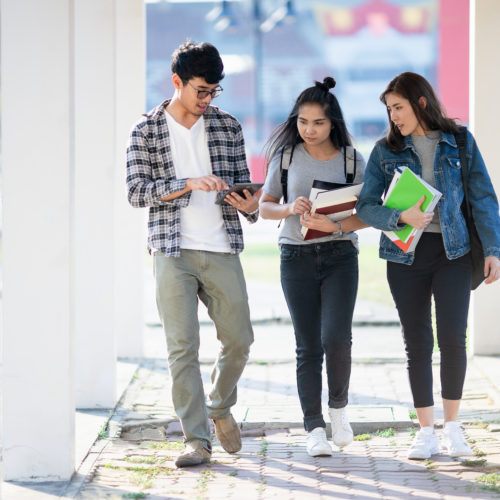
What are the possibilities for education in a world marked by AI and technological developments?
About the author
Jamie Kirkaldy, Head of Teaching and Learning Support, supports all schools delivering OxfordAQA qualifications. He was previously Head of English at an Oxford comprehensive school.
I vividly remember a staff training session I attended as a newly qualified teacher, where a member of the senior leadership team at my school breathlessly explained how teaching was the most cutting-edge profession you could work in, not only because we were preparing the adults of tomorrow but because we were preparing them for jobs that didn’t yet exist.
The same person blocked teachers being able to access YouTube on the school network because he didn’t feel it had any role to play in the classroom.
This was nearly 20 years ago.
I tell this story, partly because it always makes me smile, but mainly because I think it highlights one of the central dichotomies of the teaching profession’s relationship with technology. On the one hand, we embrace change: it’s a job that exists in a continual state of flux and development, as we refine our practice and look for new and interesting ways to engage and enthuse students. And yet, technological developments can also be a cause for fear among teachers, the main one being that it will somehow make us redundant. If students have access to all human knowledge in the palm of their hand, what need do they have for someone who can explain Pythagoras’s theorem or plant respiration or what motivated Macbeth? Can’t they just look it up?
The answer to that question lies in what we believe to be the purpose of education. Certainly, there are a lot of things that can be downloaded, and if the focal point of school is to test how much information a student has memorised over the course of their first 18 years on the planet, then, sure, I can see how a teacher may not have much of a role to play. However, if we feel – as I certainly do – that the point of education, and the point of teachers, is not to tell young people what to think but help them work out how to think, then good teachers have never been so vital.
The role technology will play in this transformation is particularly interesting because it is so hard to quantify or predict. I titled this piece by asking a direct question: What will the future of education look like in a world with AI?
The answer is, I don’t really know. Nobody does. But here’s what we do know.
We know that the hardest skills for computers to replicate are insightful analysis, emotional intelligence, creative problem solving, interpersonal skills and collaboration. So, no prizes for guessing what skills should be at the heart of 21st-century education.
Critical thinking skills, working collaboratively and self-motivation in the digital age
We know that critical thinking will be vital for young people trying to navigate a world where it will be hard to tell man-made content from AI-generated. We know that independence, self-motivation and metacognition will be key skills in an employment world that will be inherently flexible, working collaboratively with people face-to-face but with computers as well.
We also know that technological development, and AI in particular, bring huge possibilities for the teaching profession. Of course, there are issues we need to be aware of in terms of plagiarism and so forth, but banning AI from the teaching is as reductive as my old Deputy Headteacher banning YouTube. His worry was that staff wouldn’t bother teaching, we’d just find a video that explained the concept at hand, pop it on the interactive whiteboard and take the rest of the lesson off.
Needless to say, this isn’t what any of us had in mind. We saw an opportunity to access content that would exemplify the points we were making and engage students in a whole new way with our subject. Rather than stiltedly reading the balcony scene from Romeo and Juliet as a class, let’s explore how two or three different directors have interpreted that interaction. Instead of drawing a diagram of costal erosion, let’s watch news footage of buildings crashing into the sea as the cliff face collapses under the sea’s assault.
And it will be the same with AI. Imagine students being able to turn an initial idea into a fully-formed reality within seconds, realising the true potential of their imagination in real time, or road-testing a theoretical solution to a physics problem in a real-life context to see how their approach would work in application.
Practical benefits for educators
There are practical benefits in terms of how using AI and other technologies will cut teacher planning time, freeing them up to focus on the more imaginative, high-impact aspects of the job. AI could even aid that most traditional teacher bugbear – marking – and the impact of students getting feedback instantly rather than waiting to have their books returned days later cannot be underestimated.
In the next 10 years or so, education needs to show genuine leadership in technology. AI is fast becoming a key skill for universities and workplaces; it is already contributing to industries as diverse as advertising, filmmaking, bioscience, medicine and law.
But education’s key contribution will always be in the human dimension.
Technology is ultimately run and used by people, and it is their understanding of how to harness the power of AI that will drive its use in the modern world. This will be education’s role.
I see incredible potential in technology to enhance the experience of both teachers and students. Fundamentally, I believe my former colleague was right, all those years ago, teaching is a cutting-edge profession, because we work at the point where the present and the future meet. Part of the reason we don’t know what the future holds is because we haven’t finished teaching the people that will make it happen.
AI in education: where are we and what happens next?
At Oxford University Press, we believe that education should always drive technology, not the other way around. Teachers and supporting them with quality resources are at the forefront of this.
Read the report


